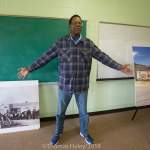I was born in Philadelphia, PA, and raised in the Southern New Jersey area (a town called Bridgeton). I would later move to the Atlanta area with my family shortly before the Olympics. In 2008 I moved to Wisconsin with my wife and two children, where we lived for nine years. During that time I was able to obtain bachelor’s degrees in Philosophy and Interpersonal/Organizational Communication. I moved to Memphis, TN in 2017 seeking a Master’s degree in Philosophy. After a year I was able to move into the doctoral program at the University of Memphis.
I learned about the Lynching Sites Project while attending a history class with Jennifer Mitchell Bennie. She would race off to the weekly meetings as our class was ending. It was through her invitation that I attended my first meeting last year. I was drawn to the mission of the organization in part because of my own academic interests. I am currently focusing on the thought of Ida B. Wells-Barnett and her anti-lynching work. It was after attending a commemoration service last year that I was convinced that I wanted to join the work of LSP. I was working alongside an organization dedicated to social justice work while in Wisconsin and was glad to find an organization here in Memphis where I could continue with that work.
I believe strongly in the work of the Lynching Sites Project. I agree with Wells-Barnett that we can only move forward through truth-telling. It is the truth that will set us all free together. I deeply appreciate LSP’s dedication to telling the truth.







